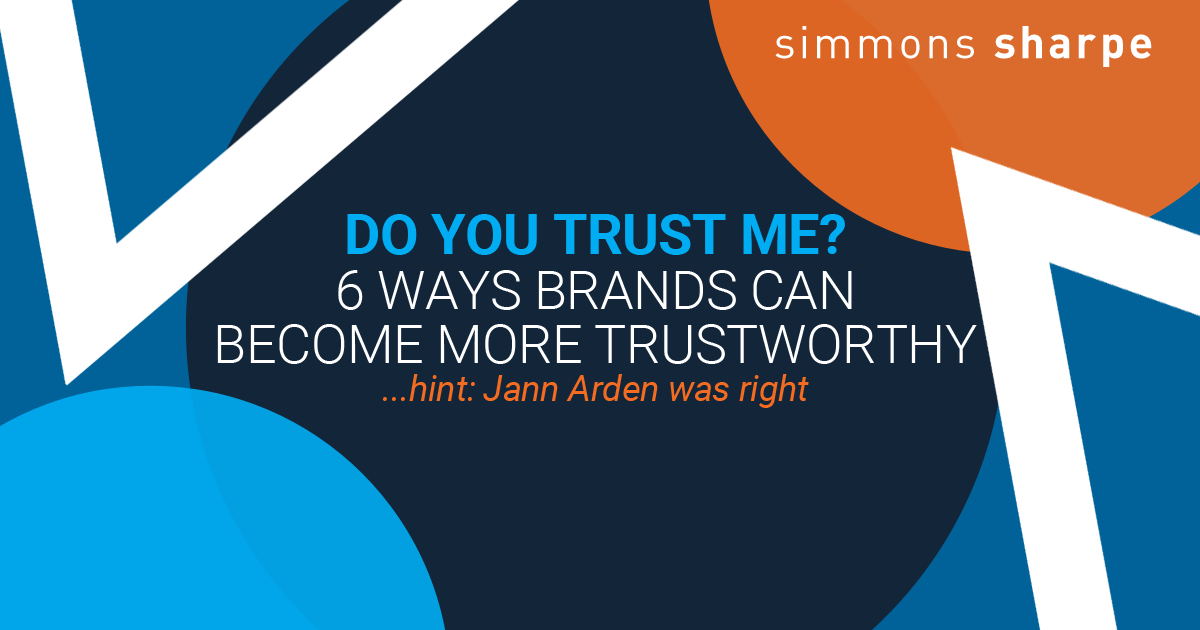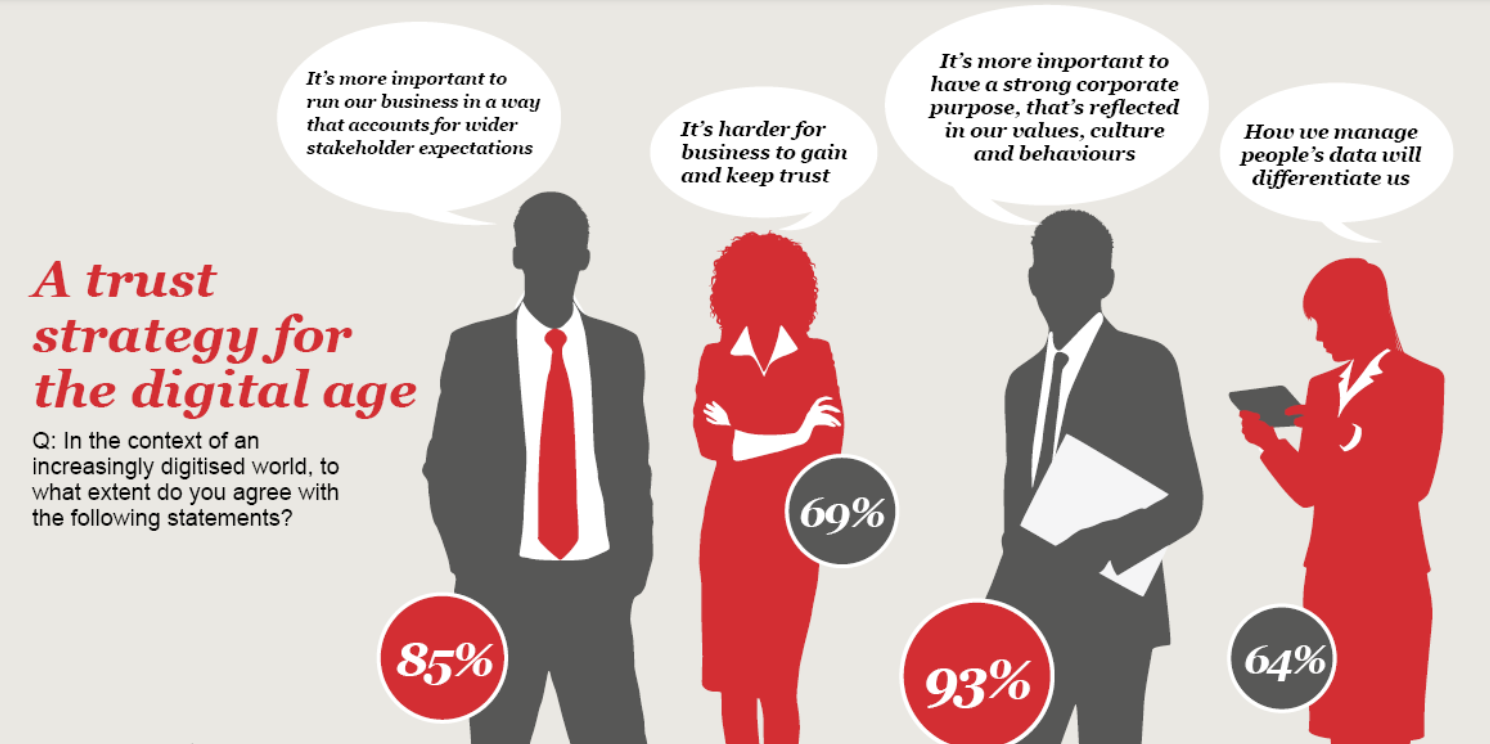6 Ways Brands Can Become More Trustworthy
Bitcoin is not the most valuable currency in the world today. Trust is. Mitchell and Bill are going to think I've gotten into the eggnog or been abducted by aliens, because I never write about the soft stuff. But there's hard data to back up how important trust is to business.
60% of people think "a person like me" is as credible as an academic or technical expert, vs. 37% who say the same about CEOs, and 29% who believe government officials, according to the 2017 Edelman Trust Barometer. 86% of respondents in a Deloitte survey said they would sever ties with a business if the organization used their data unethically. When businesses provide helpful, educational articles (as opposed to sales pitches) for consumers, those people are 131% more likely to buy from that business instead of other providers, and trust in the authoring brands grows by 9 percentage points. However, in PriceWaterhouseCoopers' 20th annual CEO survey, 69% of CEOs said it's harder to gain and sustain trust in an increasingly automated, digital world.
Source: Edelman Trust Barometer, 2017
How can brands become more trustworthy in this digital age? Note that I didn't say "how can brands build trust?" It's a subtle reframe that Rachel Botsman, author of the book Who Can You Trust? How Technology Brought Us Together and Why It Might Drive Us Apart uses in an interesting interview with Harvard Business Review. Trustworthy is something YOU are or are not, as a brand. It's not some belief you try to CREATE in your customers. It's your problem, not theirs. It is yours to earn or lose.
Source: PWC's 20th Global CEO Survey
Botsman has four recommendations, and we've added two. I've also renamed her point #4, which she calls Benevolence, to Give a Damn. Because I think it's clearer, plus I swear a lot. Here we go:
- Be Competent: Are you good at what you say you do? You can be nice, and honest, and fun, but if you're not competent, there's no way you'll deliver what you promise. If you're in the gaming business, your games have to be competitive. If you deliver packages, they better be delivered on time, consistently. It's table stakes.
- Be Reliable: Do you do what you say you're going to do, consistently? Anyone who's ever started a blog or launched a Twitter handle knows how important consistency is to building an audience and your credibility in the community.
- Have Integrity: Do your intentions align with mine? Botsman used the example of Alexa recommending clothing purchases for her daughter. If brands have a commercial intent, they should be clear about that, because (in this case) parents could decide to put appropriate controls on use of the device. Sliding a commercial intent into a product that is supposed to be helpful erodes trust.
- Give a Damn: How much do you care? Have you ever worked with an agency or consultant who responded like your emergency was their emergency? Your impending sales miss was their crisis? Every time? And have you ever let one of those guys go? Didn't think so.
- Show Respect: How much do you respect your customers' time, and their intelligence? Show up on time and get to the point. Reduce the time it takes to order, upgrade, get customer support, or even cancel, and you'll increase trust.
- Just Be Yourself: Not only is this the refrain of an awesome Jann Arden song, it's a way for brands to be more human and engaging. And engagement creates connection, and over time, trust.
Some excellent advice for brands at about 3:20 - 3:48. Credit: teamchinada
We think Botsman's on to something. Here at Simmons Sharpe, we also believe curation is critical to being trustworthy. Today, we're bombarded with information, and all feel the pressure to contribute to the social information stream. It's very easy to just skim the headlines and post based on that. In fact, 80% of people do just that.
“So often we click, we accept, we share, we make a decision as to whether something or someone or a piece of info is trustworthy based on very limited information. And so, efficiency is kind of the enemy of trust.”
But every time a prospect or customer clicks into a piece that is not what it seems, or lightweight, trust erodes. Same with a message with a tone or content that is not consistent with the brand. That's why we recommend preparing a brand voice and tone guide for marketing and customer care team members, creating pre-approved content, and making that content easily accessible and shareable via a social listening and automation tool. It minimizes "off brand" interactions that erode trust.
Building a trustworthy brand takes intention, curation, consistency, and time. Paradoxically, once that trust is earned, it shrinks the length of the sales cycle. It also makes customers more forgiving of your occasional screw-ups, more inclined to recommend your services, and more likely to give your newer, more innovative products a try. Trust is therefore the most important business currency of our frenetic times.
Hmm, this eggnog is good. Shhh...I told Bill I was working on an RFP. Good thing he trusts me.



